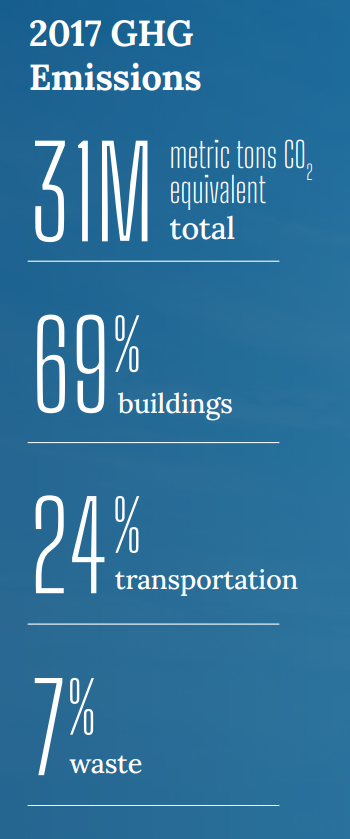Electrify Chicago
An independent tool for viewing City of Chicago building data
According to the
2022 Chicago Climate Action Plan,
69% of Chicago's emissions come from buildings, making
building emissions our biggest challenge and our biggest opportunity as a city
to tackle climate change. At Electrify Chicago, we showcase building performance using
publicly available data supplemented by community-submitted photographs and building
owners.
Start by looking at Chicago's buildings with the highest greenhouse gas intensity i.e. emissions per square foot. Large, efficient, buildings can perform much better than very inefficient small buildings on this metric.
New Article
📰 $30 Million In Missed Fines
The City Of Chicago failed to collect $30 million in potential fines from the building benchmarking ordinance, reducing transparency and accountability.
Legislative update! 🎉
As of late January 2024, legislation is being introduced to require new use more efficient forms of water and space heating, via the Clean And Affordable Buildings Ordinance (CABO), which will reduce the number of highly polluting and inefficient buildings that end up on this site.
If you're in Chicago,
write to your alderman to support the CABO!
Chicago Buildings by Greenhouse Gas Intensity
Note: Data includes large Chicago buildings with data from 2022, unless explicitly stated otherwise.
Note: This data only includes buildings whose emissions are reported
under the
Chicago Energy Benchmarking Ordinance. According to the City “As of 2016,
this list includes all commercial, institutional, and residential buildings larger than
50,000 square feet.” This dataset is also then filtered to only buildings with
reported emissions > 1,000 metric tons CO2 equivalent.
The latest year of data is from 2022, but we update the site regularly when new data is available, and some buildings may have failed to report that year, and only have older data available.
| Property Name / address | Primary Property Type |
Greenhouse Gas Intensity (kg CO2 eq./sqft) |
Total Greenhouse Emissions (metric tons CO2 eq.) |
|---|---|---|---|
|
5455 Edgewater Plaza Condo
🕰️
5455 N Sheridan Rd
| Multifamily Housing | 6.7 kg/sqft | 3,465 tons |
|
The Elm at Clark
1122 N Clark St
| Multifamily Housing | 6.7 kg/sqft
Highest 45%
| 2,387 tons
Highest 19%
|
|
500 S DEARBORN ST
500 S DEARBORN ST
| Hotel | 6.7 kg/sqft
Highest 45%
| 1,007 tons
Highest 45%
|
|
2040 2044 W BELMONT AVE
2040 2044 W BELMONT AVE
| Multifamily Housing | 6.7 kg/sqft
Highest 45%
| 351 tons
Lowest 13%
|
|
Oakwood King Condominium Building
401 417 E OAKWOOD BLVD
| Multifamily Housing | 6.7 kg/sqft
Highest 45%
| 381 tons
Lowest 15%
|
|
The Shelby
2300 S MICHIGAN AVE
| Multifamily Housing | 6.7 kg/sqft
Highest 45%
| 750 tons
Lowest 43%
|
|
Greenwood Place
🕰️
1111-1135 E. 87th Street
| Medical Office | 6.7 kg/sqft | 414 tons |
|
Beachwalk Apartments
🕰️
420 W FULLERTON AVE
| Multifamily Housing | 6.7 kg/sqft | 400 tons |
|
River West Lofts
925 W HURON ST
| Multifamily Housing | 6.7 kg/sqft
Highest 45%
| 1,183 tons
Highest 39%
|
|
1307 1325 N CALIFORNIA AVE
1307 1325 N CALIFORNIA AVE
| Multifamily Housing | 6.7 kg/sqft
Highest 45%
| 437 tons
Lowest 20%
|
|
999 N LAKE SHORE DR
999 N LAKE SHORE DR
| Multifamily Housing | 6.7 kg/sqft
Highest 45%
| 578 tons
Lowest 32%
|
|
Spertus Institute for Jewish Learning and Leadersh
610 S Michigan Ave
| College/University | 6.7 kg/sqft
Highest 45%
| 953 tons
Highest 47%
|
|
Lafayette Plaza Housing Cooperative
🕰️
50 W 71st St
| Multifamily Housing | 6.7 kg/sqft | 1,506 tons |
|
Elm Street Plaza
1130 N Dearborn St
| Multifamily Housing | 6.7 kg/sqft
Highest 45%
| 2,532 tons
Highest 17%
|
|
1700-GGP Headquarters
🕰️
110 N Wacker Drive
| Office | 6.7 kg/sqft | 1,484 tons |
Data Source:
Chicago Energy Benchmarking Data
